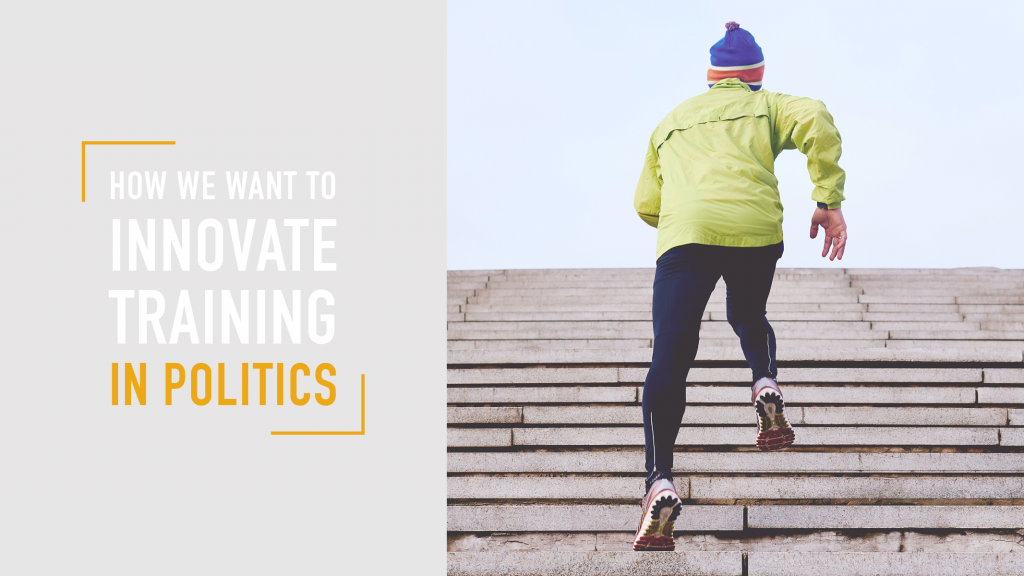This is the second part of a blog series on the evolution of POLIS.
In the last blog we looked at the rationale behind our initiative to rethink training and development in the political sphere. We outlined that leaders in the political domain are not equipped with the necessary competencies to tackle the most pressing challenges of our time, e.g. the rise of populists and extremists or climate change. We concluded that we will start a process that explores opportunities in political training and development. But we do not want to stop there: we also aim to build innovative solutions that meet the needs of political professionals and democracy in the 21st century. But how to structure such a process?
Thinking beyond organisational boundaries
Traditionally, organisations have tended to put their emphasis on using their internal capacities and R&D resources when developing innovative solutions. This so-called “theory of closed innovation” sees the place of innovation within the organisation’s boundaries. But we want to take a different approach: based on the theory of “open innovation”, we want to use the wisdom of people inside and outside of our organisation and build a community that collaboratively co-creates innovative solutions.
Open innovation approaches have rarely been used to innovate in the political sphere. Although some organisations have used elements of this approach, such as generating new ideas through public online contests, only few projects have gone all the way from ideation to implementation. A positive example in this regard is the German government’s effort to evolve and implement the ideas generated in this year’s Covid-19-Hackathon #WirVsVirus. As there seem to be few successful innovation processes to build on, we asked ourselves: what approach could fit our initiative?
Applying a human-centred approach
We started looking into innovation management literature and explored both innovation processes (e.g. The Stage-Gate Model) and innovation approaches (e.g. Frugal Innovation). We looked for a creative and collaborative problem-solving process that allows for distributed and participatory innovation and that could be the starting point for a community of change-makers in the political sphere. We found ourselves stuck on a page that fascinated us: OpenIDEO, an innovation platform that uses Design Thinking to co-create solutions for the world’s toughest problems. So we got into the world of Design Thinking.
Design Thinking is an innovation practice that focuses on the target audience and their actual needs to solve complex problems. To create innovative solutions, the design thinking process is divided into phases:
Here’s a summary of the process: Based on a deep understanding of the target audience (Understand & Observe), innovators define the challenge (Point of View) they want to address. To solve the problem which has been identified, innovators creatively develop as many ideas as possible (Ideate). After the best idea has been chosen, innovators develop a concrete prototype (Prototype) to test it with potential users (Test) to identify potential improvements. Through several iterations, innovators reach the innovative solution.
As you can see, Design Thinking is special because it not only asks the target audience directly for their input, but involves them in the co-creation of innovative solutions. So how then can we use Design Thinking to build a community of innovators to rethink training and development in the political sphere?
Using Design Thinking to rethink political training and development
To develop a sound process, we drew on the experiences of team members with backgrounds in innovation consulting, workshop facilitation, entrepreneurship, and academia. Together, we designed an innovation process that helps us to grow a community of like-minded individuals and at the same time continuously co-create innovative solutions. Our process consists of four phases:
- Understand: Through interviews and focus groups with leaders, innovators, and practitioners, we aim to understand pressing needs in training and development in the political sphere. This analysis serves as the basis for defining the problems for which we want to create solutions. Participants in this phase also serve as the foundation for the community we aim to grow.
- Prototype: Through online surveys, digital tools, and (online) co-creation workshops, we will collaboratively generate ideas that have the potential to solve existing problems and pain points. After testing ideas with the target audience, we will co-create concrete prototypes for the best ideas together with our community.
- Test: To assess the potential of our ideas, we will invite political professionals as well as our community to test our prototypes in interactive online and offline settings.
- Launch: As stated above, this initiative is not an exercise. We aim to build lasting innovative solutions that equip leaders and practitioners in the political sphere with the right mindset, skillset and toolset to meet the most pressing challenges of our time.
In August and September 2020 we conducted interviews and focus groups with innovators, political practitioners, entrepreneurs, and other like-minded peers from across Europe. In these formats we have the opportunity to deep dive into the status quo of political training and development and explore what’s needed. We will soon share the insights we derived from these sessions.
